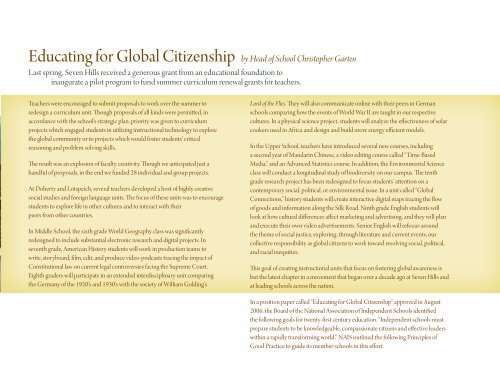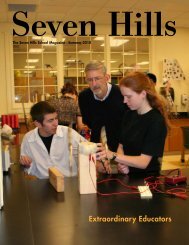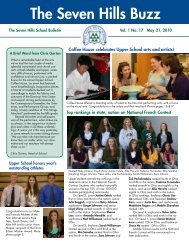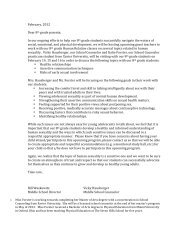Connecting to the world through global education page 13
Connecting to the world through global education page 13
Connecting to the world through global education page 13
Create successful ePaper yourself
Turn your PDF publications into a flip-book with our unique Google optimized e-Paper software.
Educating for Global Citizenship by Head of School Chris<strong>to</strong>pher Garten<br />
Last spring, Seven Hills received a generous grant from an <strong>education</strong>al foundation <strong>to</strong><br />
inaugurate a pilot program <strong>to</strong> fund summer curriculum renewal grants for teachers.<br />
Teachers were encouraged <strong>to</strong> submit proposals <strong>to</strong> work over <strong>the</strong> summer <strong>to</strong><br />
redesign a curriculum unit. Though proposals of all kinds were permitted, in<br />
accordance with <strong>the</strong> school’s strategic plan, priority was given <strong>to</strong> curriculum<br />
projects which engaged students in utilizing instructional technology <strong>to</strong> explore<br />
<strong>the</strong> <strong>global</strong> community or <strong>to</strong> projects which would foster students’ critical<br />
reasoning and problem solving skills.<br />
The result was an explosion of faculty creativity. Though we anticipated just a<br />
handful of proposals, in <strong>the</strong> end we funded 28 individual and group projects.<br />
At Doherty and Lotspeich, several teachers developed a host of highly creative<br />
social studies and foreign language units. The focus of <strong>the</strong>se units was <strong>to</strong> encourage<br />
students <strong>to</strong> explore life in o<strong>the</strong>r cultures and <strong>to</strong> interact with <strong>the</strong>ir<br />
peers from o<strong>the</strong>r countries.<br />
In Middle School, <strong>the</strong> sixth grade World Geography class was significantly<br />
redesigned <strong>to</strong> include substantial electronic research and digital projects. In<br />
seventh grade, American His<strong>to</strong>ry students will work in production teams <strong>to</strong><br />
write, s<strong>to</strong>ryboard, film, edit, and produce video-podcasts tracing <strong>the</strong> impact of<br />
Constitutional law on current legal controversies facing <strong>the</strong> Supreme Court.<br />
Eighth graders will participate in an extended interdisciplinary unit comparing<br />
<strong>the</strong> Germany of <strong>the</strong> 1920’s and 1930’s with <strong>the</strong> society of William Golding’s<br />
Lord of <strong>the</strong> Flies. They will also communicate online with <strong>the</strong>ir peers in German<br />
schools comparing how <strong>the</strong> events of World War II are taught in our respective<br />
cultures. In a physical science project, students will analyze <strong>the</strong> effectiveness of solar<br />
cookers used in Africa and design and build more energy efficient models.<br />
In <strong>the</strong> Upper School, teachers have introduced several new courses, including<br />
a second year of Mandarin Chinese, a video editing course called “Time-Based<br />
Media,” and an Advanced Statistics course. In addition, <strong>the</strong> Environmental Science<br />
class will conduct a longitudinal study of biodiversity on our campus. The tenth<br />
grade research project has been redesigned <strong>to</strong> focus students’ attention on a<br />
contemporary social, political, or environmental issue. In a unit called “Global<br />
Connections,” his<strong>to</strong>ry students will create interactive digital maps tracing <strong>the</strong> flow<br />
of goods and information along <strong>the</strong> Silk Road. Ninth grade English students will<br />
look at how cultural differences affect marketing and advertising, and <strong>the</strong>y will plan<br />
and execute <strong>the</strong>ir own video advertisements. Senior English will refocus around<br />
<strong>the</strong> <strong>the</strong>me of social justice, exploring, <strong>through</strong> literature and current events, our<br />
collective responsibility as <strong>global</strong> citizens <strong>to</strong> work <strong>to</strong>ward resolving social, political,<br />
and racial inequities.<br />
This goal of creating instructional units that focus on fostering <strong>global</strong> awareness is<br />
but <strong>the</strong> latest chapter in a movement that began over a decade ago at Seven Hills and<br />
at leading schools across <strong>the</strong> nation.<br />
In a position paper called “Educating for Global Citizenship” approved in August<br />
2006, <strong>the</strong> Board of <strong>the</strong> National Association of Independent Schools identified<br />
<strong>the</strong> following goals for twenty-first century <strong>education</strong>. “Independent schools must<br />
prepare students <strong>to</strong> be knowledgeable, compassionate citizens and effective leaders<br />
within a rapidly transforming <strong>world</strong>.” NAIS outlined <strong>the</strong> following Principles of<br />
Good Practice <strong>to</strong> guide its member schools in this effort.





